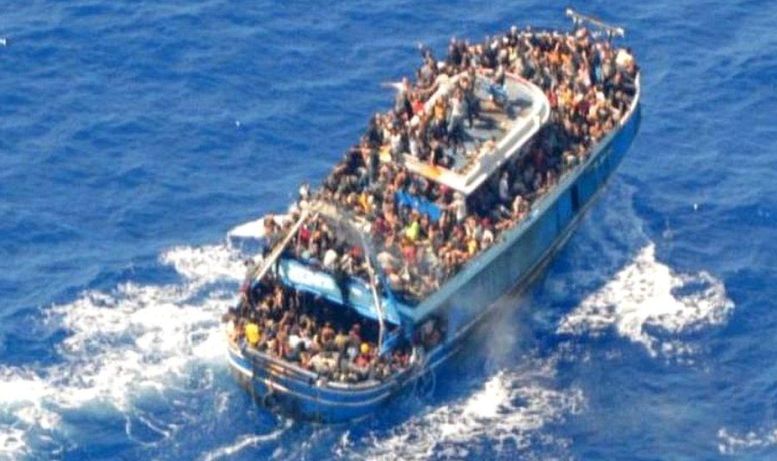In the media industry, there’s an old saying: “if it bleeds, it leads.” Sometimes the blood is real and gory, sometimes it’s a metaphor where the story in question involves drama, suspense, conflict or death, and, of course, “human interest.” The story gets top billing — the lead news story. And often it will displace “more serious” topics such as the day-to-day war grind in Ukraine or the question of foreign interference in Canadian politics.
The two sea disasters in question are: the shipwreck off the coast of western Greece in the early hours of June 14 with an estimated 700 migrants dead; and the implosion of the Titan submersible on June 22 in the North Atlantic with all 5 persons onboard killed. There are some similarities and some differences between the two stories. Both took place at sea although in vastly different vessels. The number of casualties was not the same — an estimated 700 vs 5. The demographics of the people on the migrant ship involved were different — poor people from Palestine, Syria, Egypt, Pakistan vs a small group of rich people who had paid $250,000 each for the privilege of exploring the undersea depths.
Media coverage
The media focus was on the urgent search for a small group of rich individuals and adventurers who went missing during their expedition to examine the Titanic. The other tragic incident — a fishing boat filled with migrants attempting to seek a better life for themselves — was downplayed. Thus, the deaths, the detainment of individuals, outbreaks of violent protests, and concerns about the lack of action and follow up by the Greek authorities received a lot less coverage in the media. Many people commented on the mainstream media treatment of the two stories, given their similarities and that the two incidents happened within days of each other. It brings to mind the actual sinking of the Titanic of 1912. The deaths of the cream of New York society got all the attention, while the emigrants in steerage were virtually ignored. “I can’t stop thinking about all the migrants who have died at sea and other ways and no one cared about them or their families. Theirs wasn’t a joy ride for thrills and chills either,” commented someone on Twitter.
The UN migration agency has reported that 2022 was the deadliest year for migrants in the Middle East and North Africa seeking to reach Europe since 2017, with at least 3,800 people dying on sea and land migration routes. The UN has registered more than 20,000 deaths and disappearances in the central Mediterranean since 2014, making it the most dangerous migrant crossing in the world. On top of that, analysis of the movement of this migrant boat and other ships in the area suggests that, contrary to the claims of the Greek coastguard, the migrant boat was not moving for at least seven hours before it capsized. Contrast this with the rapid and immediate response to the discovery that the Titan had lost communication with the “mother ship.”
There is legal duty to rescue people in distress at sea, yet rescuers have been prosecuted by the Italian government. The European Union has a deliberate policy to not help migrants on the Mediterranean. Thus, the high rate of death.
Democracy Now commented, “Perhaps the most notable difference between these two disasters was how the world responded to them. Governments immediately spent millions mounting a search and rescue operation to find the Titan, submerged somewhere in the north Atlantic. … Media outlets provided continuous coverage, with one launching a countdown clock predicting when the submersible’s oxygen would run out. The U.S. Coast Guard and Navy and the Canadian government sent planes and boats to the search the area. France and Canada each deployed deep sea robots. People around the world watched and waited breathlessly.”
It would be a mistake to have a position, at least publicly, on the Titan disaster that “those rich bastards deserved to die.” In a socialist society, a vanity trip like this would not have been allowed to happen. And if it was given the green light, for scientific or historical reasons, there would be a lot more control over design and safety than the imploded Titan was subject to.
Chomsky – manufacturing consent
Noam Chomsky, the distinguished anti-capitalist, wrote about ten “strategies of manipulation by the media.” Number 6 is:
“Use the emotional side more than the reflection — Making use of the emotional aspect is a classic technique for causing a short circuit on rational analysis, and finally to the critical sense of the individual. Furthermore, the use of emotional register to open the door to the unconscious for implantation or grafting ideas, desires, fears and anxieties, compulsions, or induce behaviors …”
It’s understandable that people would be gripped by a real story of people in peril. Whether it’s the Titan submersible or the Thai cave disaster of 2018 or the Chilean miners trapped underground in 2013, the natural human feeling is to affirm a collective wish for human ingenuity and spirit to triumph over adversity. And in that sense, the media can effectively play on the emotional side.
Internet democracy
Media manipulation and media ownership go hand in hand. The 20th-century American journalist, A. J. Liebling, famously wrote, “Freedom of the press is guaranteed only to those who own one.” That was in the 1960s, pre-Internet. Today, there are some who believe this statement doesn’t apply on the grounds that, with social media access, 3.2 billion people have the potential to “own a press.” Any one of these 3.2 billion can say anything they want. And if it goes viral — especially if it’s from a celebrity — it’s “news.” Opinions become “fact.” “Facts” are carefully selected to make a point. It may be complete nonsense, but it’s “news” — especially when the papers, TV and radio pick it up. That’s not to say that there isn’t some well-researched, well-written, deeply probing news and information from the liberal media and independent websites — there is — but these are small beacons of integrity in a huge sea of noise.
Does anyone have a monopoly of propaganda?
How to drown out that sea of noise? The fact that there is virtually no workers’ press in Canada, or in most countries, is a true shame. In 1914, the German socialist party, the SPD, published a daily newspaper, Vorwärts (Forward) with a circulation of 160,000. True readership was very much higher — between four and five times that amount. In these days, it would probably be too much to expect the NDP or the Canadian Labour Congress to produce a monthly newspaper/magazine, let alone a daily one. Yet that is what is needed, along with a creative use of social media. Some may argue that producing another so-called propaganda sheet (a workers’ newspaper) in competition with the mainstream capitalist ones is not going to cut through the haze of misinformation that is out there. This misunderstands the nature of propaganda.
“What is truly vicious,” observed the New York Times in an editorial in September 1937, “is not propaganda but a monopoly of it.” Note the year — 1937 — when Hitler and Goebbels were at the height of their powers in Nazi Germany. The word “propaganda” is derived from the Latin verb propagare, meaning to propagate, to disseminate, to spread. Fairly innocuous, no? So, when Socialist Alternative members go out on the streets to sell their magazine, they are indeed propagating or spreading their word. But, unlike the German Reich, they don’t have a monopoly of the word. That privilege belongs to the media moguls, the Facebook/Twitter oligarchs and the Putins of this world — or they’d like to think so.
Controlling the thought processes
The capitalist-controlled media and the education system are the two main tools that the ruling class uses for shaping the thinking of ordinary people. Unfortunately for the elites, they don’t have a system that guarantees their ability to control the thought processes or consciousness of the average worker. Material reality often clashes with the “reality” that the capitalists try to put across or even to propagate! If the media tells you that you are well fed and every night your stomach tells you that you are hungry, eventually you will believe your stomach. Workers deal with the unreality of the media bosses’ world, not by writing letters to the editor, but by taking action — strikes, protests, occupations and, sometimes, revolutions.
In the 1930s, a British trade union leader proclaimed, “Give me control of Fleet Street (the London street where the majority of British newspapers were published) today and I can guarantee we’ll have socialism tomorrow.” It was exaggeration, to say the least, but his statement does give an idea of the power the right-wing press exerted to limit the struggle for socialism.
Socialist Alternative, whether it’s the online or paper version, will play a modest but important role as an educator and organizer. It will continue to debunk the lies of the mainstream media and argue the case for socialism. As our ideas reach more workers, we are confident that the workers themselves will break out from the distorted view of society that capitalism has framed for them.



